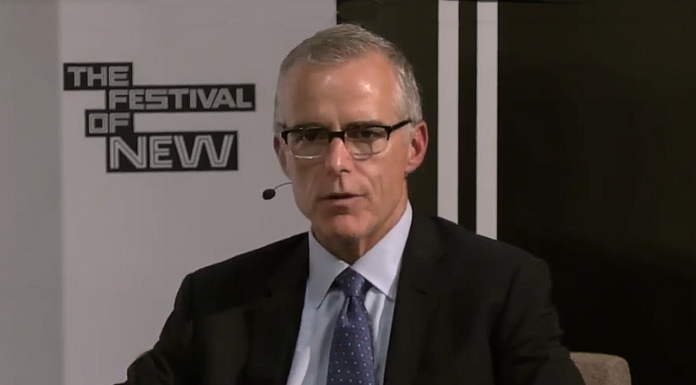It turns out that then-president-elect Donald Trump and his team weren’t the only ones fuming over the fake news in the months after the 2016 election.
Top FBI officials who were conspiring to undermine Trump with baseless allegations of Russian collusion were livid that the media kept messing up stories that had been spoon-fed to them through selective leaking, Just the News reported.
A tranche of text messages and other correspondence analyzed by Just the News investigative reporter John Solomon found that partisan operatives within the agency were trying to work the refs, criticizing the minutiae in the stories while diverting newsroom attention from the Big Lie looming overhead.
“Yes, the headline is REALLY misleading,” then FBI deputy counsel Lisa Page complained about a New York Times article that the FBI had shopped to the outlet.
They mocked the reporters for missing the entire point of the piece and focusing instead on irrelevant details.
“I’m glad it was so superficial,” Page’s colleague replied. “If they decide to start digging deep, we are screwed on trying to protect some of our stuff related to that case.”
The exchange offered insight into the politicization that was rampant at the FBI during the Obama era, when corrupt, partisan hacks including Director James Comey and Deputy Director Andrew McCabe were overseeing it.
Their actions were later criticized in a series of investigations by the Justice Department inspector general.
Page speculated that someone from the bureau’s notorious 7th floor may have “suggested” a favorable story about the bureau “to remind people that we are still the good guys trying to keep America safe and not political operatives who sway elections.”
Page seems to have failed to see the irony that the FBI’s waging of a backdoor propaganda campaign of planting positive stories about itself in the press might not have been the most logical way to reassure the public that it was acting in their best interest.
The culture of leaking—for which McCabe ultimately was fired in 2018 while serving as the FBI’s acting director—appeared to be far more widespread than even the IR report had acknowledged, according to Solomon.
In many cases, top FBI brass maintained a first-name basis with reporters at national media outlets, revealed the thousands of declassified messages.
With the plan to ensnare Trump resting on a delicate balance of contingencies, the media’s role in swaying the public to the narrative was crucial.
But the same obtuse and obsequious mentality that made leftist journalists such useful co-conspirators also raised the alarm that the press’s failing to report the fake news accurately and precisely as instructed could risk derailing the whole effort.
In a December 2016 Washington Post piece about the FBI and CIA agreeing that Trump colluded with Russia, one official ranted, “The rewrite headline is still wrong.”
Among the biggest critics of the fake media coverage’s lack of accuracy was biased agent Peter Strzok, who led both the bogus investigations into Trump (“Crossfire Hurricane”) and Democrat Hillary Clinton (“Midyear Review”).
In a Jan. 19 article, a day before Trump’s inauguration, Strzok and a colleague offered a candid assessment of their strategic partners in the press, while conveying little self-awareness about their own similar shortcomings.
“Yeah, and it’s not even news!” Strzok wrote in reply to the article.
“No substance, and largely wrong,” he added. “The press is going to undermine its credibility.”
Whereas the FBI trade-craft often involved careful omissions or ambiguous wordage to make something appear more shocking or salacious, reporters would run with the story as they understood it, producing glaring inaccuracies that made the agency’s surgically precise disinformation efforts look more like a mallet.
In one case, the New York Times falsely claimed the FBI had intercepted contacts between Trump staffers and Kremlin officials.
Meanwhile, the agency was painstakingly attempting to downplay its lack of direct evidence after Trump advisers like Carter Page had expressly denied any such contacts potentially yielding exculpatory evidence instead of incriminating the Trump officials.
Strzok furiously penned a memo outlining nine inaccuracies in the Times’s front-pages story.
“”We are unaware of ANY Trump advisers engaging in conversations with Russian intel officials,” he wrote. “Our coverage has not revealed contact between Russian intelligence officers and the Trump team.”
After the inaccuracies came to light, the FBI faced new pressure to acknowledge the Times story’s failures and forcing the FBI to dig itself deeper into the deception.
“We will never get away from this,” wrote one colleague about the collateral damage that the misreporting had done to the FBI’s carefully crafted narrative.
But the emails note that officials—and McCabe in particular—continued to reach out to the media, suggesting the accuracy of the reports was secondary to the damage being inflicted on the Trump administration.
McCabe even enjoyed socializing with many of the reporters he was working with, according to his emails.
As his relationship soured with Trump, though, putting him under the microscope much as Comey had been the year before, McCabe’s inability to resist schmoozing with the media wound up snaring him in his own trap.
McCabe was fired after he was caught leaking details of a story to the Wall Street Journal that he wasn’t authorized to leak, and then lying about it.

